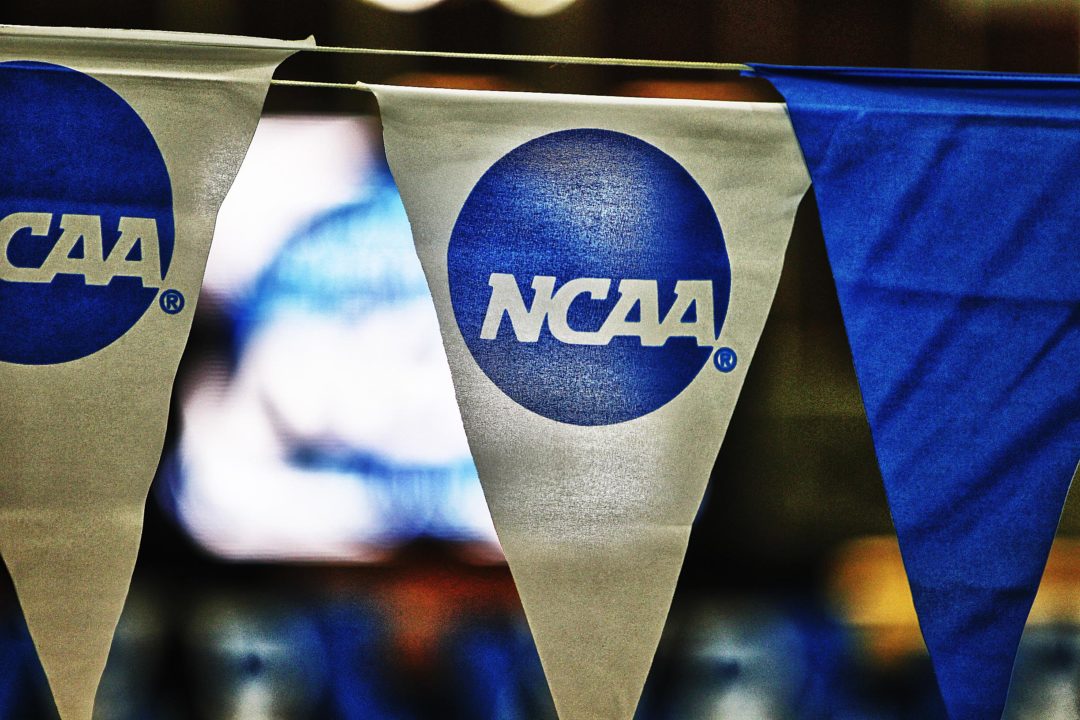Courtesy: Elizabeth Wickham
The recent college bribery scandal has a lot of parents outraged—including myself. Our kids work so hard to get into college, both in the pool and academically. It’s disheartening to learn that parents paid to get their kids into school — and that college coaches took bribes. Many of our own kids were turned down by some of these same schools, yet legitimately were more deserving. Fortunately, we haven’t read about any swim coaches involved, yet. The swim times don’t lie and coaches know this. As swim parents, we know how hard swimmers on college teams worked to earn their spots.
My son decided not to swim in college. Everyone believed his strong academics and other activities would ensure a place in his dream schools. Little did we know that it’s not a level playing field or a meritocracy, to say the least. He was declined by eight out of nine colleges he applied to—despite being valedictorian, having almost perfect test scores, volunteering in the community and other activities.
Contrast that to my daughter’s college recruiting experience. She was a Junior National level swimmer and decent student who had a number of doors opened because of swimming. Her experience was fun and joyful in comparison to her brother’s.
I encourage parents to weigh the benefits of swimming in college. Yes, it’s hard work, but there are many reasons to swim including admissions and earning college scholarships. Mike Cody, head coach of the Trident Swim Club in Rowland Heights, CA said that Susan Teeter, the ultra-successful 33-year head coach of Princeton Women’s Swimming, gave a clinic for their team and discussed the many benefits of swimming in college.
Here are some of the reasons Teeter and others have given for swimming in college:
ONE
Admissions.
Swimming opens doors. Your kids may learn about schools because a coach reaches out to them. Coaches are allowed to “flag” students for admissions which can help them through the otherwise daunting process. Many top schools and state universities have more than 75,000 applications for 3,000 or fewer freshman spots.
TWO
Priority Registration.
Once your child is enrolled in school, many schools offer priority registration for student-athletes. That means student-athletes get their classes and aren’t impacted by too many students wanting to enroll. With preference and early registration dates, they’ll get the classes they need.
THREE
Scholarships.
Scholarships are icing on the cake and will make your children realize all their hard work paid off. Although there are few “full rides,” college coaches can help guide athletes to other scholarships available. For example, the university may have an “incoming freshman academic scholarship” that you wouldn’t know about unless you read through pages and pages of the school’s website.
FOUR
The Team.
The day my daughter moved into the dorms, her teammates knocked on her door, holding goody bags, welcoming her to the school and team. They invited her to a barbecue and other team events, and made sure she felt included. My son said he was lonely for the first few weeks—and guess what? Nobody knocked on his door and said come join us. Being part of a team helps build life-long friendships and reinforces all the teamwork lessons that are useful throughout life.
FIVE
Support Services.
Depending on the school, your swimmer may receive perks not available to other non students-athletes. Whether it’s free tutors, access to trainers, fueling stations, massage therapists or sports psychologists, your student-athlete’s school wants your child to succeed.
SIX
Structured Environment.
Our kids are used to swim practice. They know what to expect and how practice fits into their day. Having a familiar routine can help them adjust to being on their own. With everything different in their daily life, such living in a dorm room with strangers, cafeteria food, new professors and a strange class schedule, they can count on swim practice and the pool to be there.
What other benefits does swimming bring to the college experience?
 Elizabeth Wickham volunteered for 14 years on her kids’ club team
Elizabeth Wickham volunteered for 14 years on her kids’ club team as board member, fundraiser, newsletter editor and “Mrs. meet manager.” She’s a writer with a bachelor of arts degree in editorial journalism from the University of Washington with a long career in public relations, marketing and advertising. Her stories have appeared in newspapers and magazines including the Los Angeles Times, Orange County Parenting and Ladybug. You can read more parenting tips on her blog.

Let’s not lose sight of the fact that there are 1000’s of collegiate coaches that have done things well and the right way with the highest levels of integrity. It’s horrible that these few bad eggs have cast negative light on the rest. My faith lies in 99.9% of those that do good. Individuals didn’t lose spots of admission to the handful of kids whose parents cheated the system. The admissions process is difficult. Period. Cheaters notwithstanding….